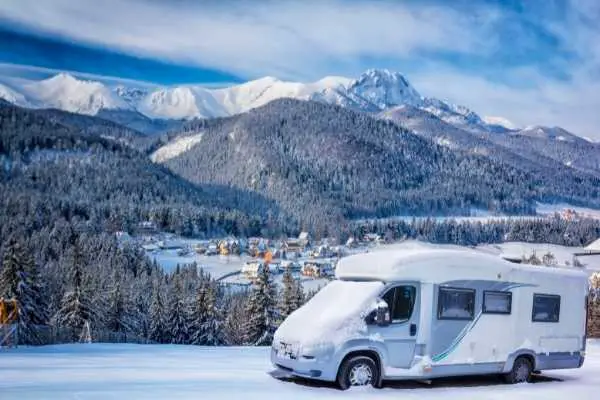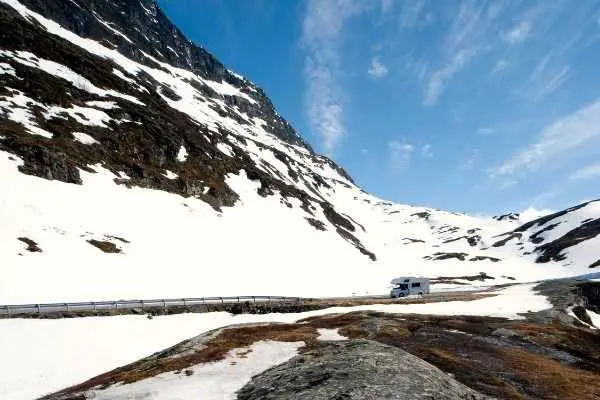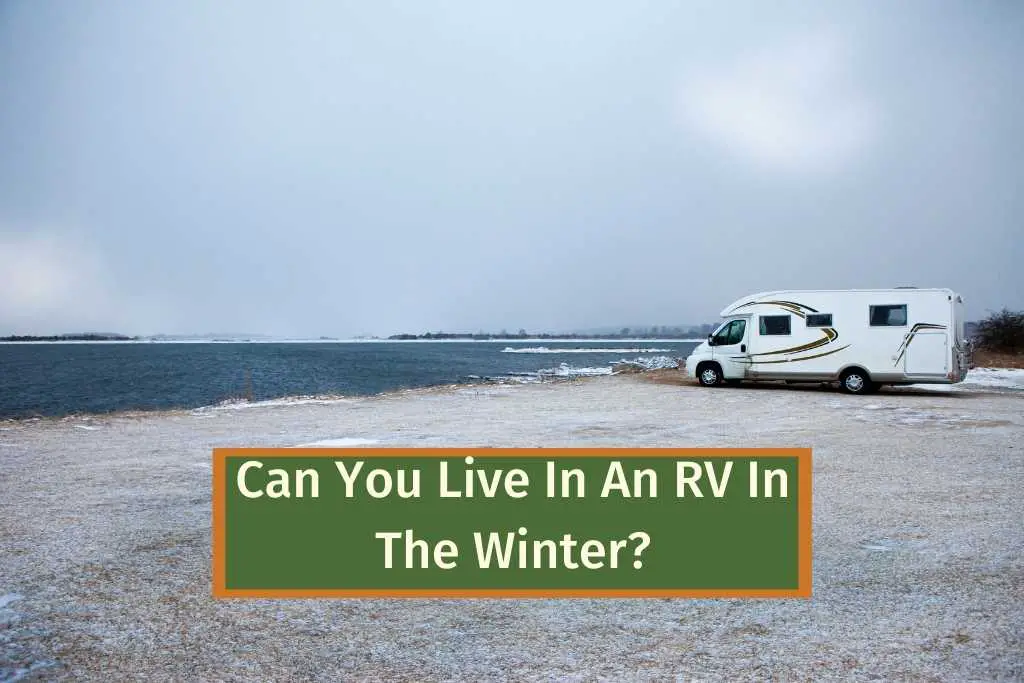Winter is coming and many people wonder if living in an RV can be done, especially when it comes to the cold temperatures. So, can you live in an RV in the winter?
You can live in an RV in the winter, but you will need to be prepared for the cold temperatures so you (and your RV) don’t freeze to death. This article will go into winter RV living and give you some tips and tricks to make it easier.
Can You Live In An RV In The Winter?
Living in an RV is amazing but it’s also hard work, especially when the temperatures go down. The key to living in your RV during winter is planning.
Yes, you can live in an RV in the winter. But, you need to be prepared for the weather to make sure that you will be warm enough in your RV so you are comfortable. You will also want to make sure that your RV is protected against the cold where you can, this can take some preparing for.
It’s hard to maintain a moderate temperature in your RV, whether that’s cooling it down in the summer or heating it up in the winter. Both are important and so your RV needs to have great insulation. If you have a slide out then this article is all about insulating your slide out for maximum effect.
Keeping the cold out and the heat in is harder than it sounds in an RV, in this article I’ll share all the tips I’ve learnt along the way to keep your camper nice and cozy.
How To Live in an RV in the Winter
Anyone who has spent time in a tent or camper knows that autumn and winter can be tough times of year. The metal and plastic sides of your RV will trap cold air, and it can be difficult to stay warm without running the generator for hours every day.
Living in an RV during the winter months isn’t impossible – with these simple tips and tricks to keep things warm, it can be cozy and surprisingly comfortable!
Just like you an RV can freeze to death so you will need to protect your RV as much as you protect yourself during the winter months.
The best thing to do is insulate your RV: Whether it is a fiberglass or metal shell, insulation should be added to your RVs walls.
You’ll also need to protect your RV’s pipes and tanks from freezing, if they freeze then they can burst and that will be an expensive problem to fix. The best way to do this is to make sure your pipes are well insulated and you dress your RV in a skirt.
Insulate your windows at night with insulated curtains or boards, your windows will lose a load of heat so try to insulate them as well as you can.
Let’s go into more details about how to best protect you and your RV during the cold winter months.

Tips For Living In An RV During The Winter
Protect Your RV Plumbing
Keeping the water flowing in your RV is difficult when the temperatures drop below freezing, it only takes a few hours for your pipes to freeze and the potential damage of this can be catastrophic.
A heated water hose is a must for living in an RV during the winter, it will ensure that you will always have a fresh water supply coming into your RV. Frozen hoses help no one and it’s easier to keep the water flowing with a heated hose like the one below.
[elementor-template id=”2813″]
If you don’t have a heated hose you can insulate the hose you do have and add electrical heated tape around it, although this can end up being more expensive and less effective than purchasing a heated hose.
You can leave the faucet on in your RV to let a small amount of water constantly run through the system to help prevent it from freezing. However this is wasteful and can be annoying when you are trying to get to sleep.
Don’t have your grey and black tanks hooked up as they can freeze and then you’ll have no drainage for either – a frozen sewer hose is as bad as it sounds. Instead empty them when they are full to keep them flowing.
On the same note you don’t want to fill your holding tanks too full, because if they do freeze then they will have to expand and if they are full this could mean they explode or the waste water comes back out through your bathroom and freezes.
In most cases having the heat on in your RV will prevent the holding tanks from freezing, so try to have the heat on as much as possible to prevent them from freezing solid.
Insulate Everything
The lightweight walls of an RV or travel trailer make it easy to drive or tow, but they are terrible for keeping your RV insulated and retaining the heat.
If you want to live in your RV during the winter then you will have to add insulation where you can.
Make sure that your RV is well sealed and there are no gaps around the windows, doors or vents that will let the heat escape. Use RV caulk or waterproof tape along the seals to plug the gaps to help insulate your RV.
Cut out styrofoam boards and place them on the windows and doors as these are the areas that will let most of the cold in and the heat out.
Get vent covers for your RV, lots of warm air will try to escape through the vents but this is reduced with a vent cover. It also allows you to open the vents so you can let the condensation out.
Use An RV Skirt
RV skirts wrap around the bottom of your RV or trailer, and look like a skirt – hence the name. They cover the underbelly of your RV and massively help to keep it warmer in winter as it stops the cold air from getting under your RV.
Keep Water Out Of Your RV
Nobody wants to be cold and damp, and neither does your RV, keep moisture out of your RV with dehumidifiers. Heating your RV in the cold will cause condensation which can lead to mold and mildew in your RV, a few cheap dehumidifiers in your RV will help to keep the moisture levels down.
Use Space Heaters
This may sound like an obvious one, but it can sometimes be overlooked. Use electric space heaters in addition to your RVs heating. It will help to take the edge off and is useful for when you just need to heat an area of your your RV. It’s also very important to have for backup, the last thing you want is no source of heating when your living in an RV during the winter.
Put Your Thermals On
Make sure that you winterize yourself as well as the RV, this means wearing plenty of warm clothes. Make sure that you have thermal under clothes, thick socks and warm jumpers and coats.
You will also want to make sure that you are sleeping in a thermal sleeping bag or at least a very thick duvet. Night time is when the temperatures will be at the lowest and when you are sleeping is when your RV will also drop in temperature so make sure that you have plenty of blankets and thermal sleeping bags to keep you warm while you sleep.
Keep A Good Supply Of Propane And Gas At All Times
Not only will you go through much more propane and gas to heat your camper during the winter, but depending on the weather you might be cut off from getting more. Make sure that you always have back up propane to use.
Use A Sewer Hose Stand
Use a stand for your sewer hose, the ground is a lot colder than the air during winter which means your sewer hose is more likely to freeze if it’s just laid on the ground. A frozen sewer hose is less than ideal so keep it raised and drain the tanks as quickly as possible.
Don’t Let Your RV Get Cold
Keep your RV heated all the time, it’s more energy efficient in the long run and will prevent the damage that can be caused when things freeze.



Living In An RV During The Winter Essentials
If all the tips above feel like a lot to take in, I’ve summarized the most important essentials for you to have if you plan on staying in an RV during the winter.
- Heated water hose
- Propane heater
- Electric space heater
- Warm clothes and thermal sleeping gear
- Extra supply of propane
By having the above items at a minimum you will be able to live comfortably in you RV when it gets colder, although extra insulation and skirting is recommended.
Can You Live In An RV In The Winter – FAQs
How cold is too cold for an RV?
Temperatures below -19ºF (-28 Celsius) is too cold to stay in an RV, at these temperatures you won’t be able to keep the RV warm or the tanks from freezing. You are best to drive south for some warmer temperatures, if the engine still works.
Can You Drive An RV In The Winter?
Yes you can drive an RV in the winter, but you will want to drive as slowly and as carefully as possible. Remember that you are driving a large vehicle and it will be a lot more difficult to stop and manoeuvre than a car in icy conditions.
Will RV holding tanks freeze?
Yes your holding tanks can freeze, try to keep your RV heated at all times to keep your tanks warmer. You can also use RV antifreeze and keep water flowing in your RV to help prevent the tanks freezing.
Can You Live In An RV In The Winter? – Final Thoughts
Living in an RV during the winter can be a magical, cozy experience and you will have an amazing adventure. However, if you are planning on living in your RV during the winter you will need to be well prepared. Use the tips laid out in this article to help you get your set up right and you won’t look back.


